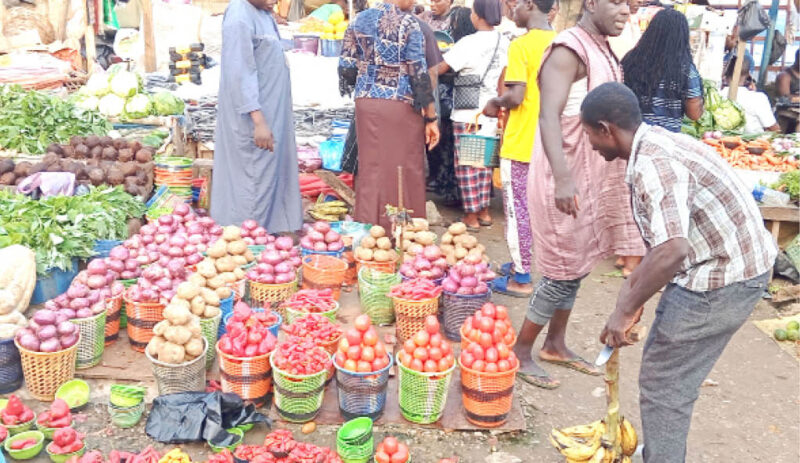By Vincent A. Yusuf (Abuja), Abubakar Akote (Minna), Magaji lsa Hunkuyi (Jalingo) & Ibrahim Musa Giginyu (Kano)
Farmers and the federal government have disagreed over the recent drop in prices of food items across the country.
SPONSOR AD
Many of the farmers and their associations, who spoke to Daily Trust, cited what they described as massive importation of food items recently approved by the government as the cause of the price crash.
But the Minister of State for Agriculture and Food Security, Aliyu Sabi Abdullahi, attributed the development to the various incentives introduced by the present administration to boost local production.
This is just as farmers have also expressed worries over the soaring cost of agricultural inputs which, according to them, is making food production increasingly difficult.
They told Daily Trust that they had held on to old stock, hoping to sell at higher prices to cushion earlier losses.
The government had, in September 2024, opened a 150-day duty-free window for the import of essential grains such as rice, maize, sorghum and wheat.
The July–December 2024 waiver was aimed at reducing the prices of essential food to provide relief to millions of Nigerians struggling with high living costs.
However, the import, which continued until January 2025, forced the prices of major grains, including wheat, millet, sorghum rice and maize, to plummet below production cost.
As a result of this, a large number of farmers who made significant financial investments in the production of grains are still losing money, and some of them are still trapped with old stock.
However, the minister, Abdullahi, said the government had yet to release the food items it imported. Answering questions from journalists during the World Food Day celebrations in Abuja, he said the government was aware of the impact of the drop in food prices and that it was working to mitigate it.
“We are fully aware of some of these dynamics, but let me make it very clear that, of course, we are looking at food security for our citizens, that is the overall interest of government. And if food is available, accessible, but not affordable, whoever is involved in the non-affordability will tell you it’s not food secure. Yet, we want an economy and a country where everybody is inclusively included in whatever we are doing.
“No one is left behind. So, what the government is doing is, ever since we came on board, we did not hide our intention to see that the prices of food come down to a level that is affordable.
“Now, what has happened is that from 2023, we went into massive production through the National Agricultural Growth Scheme and Agro-Pocket Programme. We injected a large volume, almost more than 500,000 metric tons of wheat, including maize, cassava, and all the other commodities that we promoted.
“This year, we also have a marginal increase, which means we are ramping up production. Now, the volume of food that is produced is responsible for the drop in prices,” he explained.
But farmers insisted that a simple visit to markets across the country would confirm the influx of imported food items, including other things like starch and ginger that were not among things approved.
And like in the states, price of foodstuffs, especially local rice, beans, guinea-corn, maize, millet, cassava flour, yam, and garri, has further crashed by up to 50 per cent in various rural markets in the Federal Capital Territory (FCT).

Farmers count losses
Mrs Blessing Janaru said she had many bags of maize, paddy and millet from 2024 harvest unsold because if she sells now, ‘the losses will be too much.’
“I spent more than N2.5 million and if I sell all of them, I cannot even get N1.5 million. So I decided to keep it hoping the prices go up; instead, it continues to fall, particularly for maize and millet,” she said.
Prof. Yusuf Sani Ahmad, the Executive Director, of the National Agricultural Extension and Research Liaison Services (NAERLS), while presenting the 2025 Wet Season Agricultural Performance Survey (APS) recently, drew the attention of the Minister of Agriculture and Food Security, Abubakar Kyari, to the fact that the current low prices of crops caused huge losses to the farmers.
“While the farmers have issue with high cost of inputs, especially fertilizer, the prices of food significantly crashed.
“Sir, the farmers are crying, it is only the consumers that are smiling. Something has to be done, that is the truth. Some are reporting that they would not go back to the farm. I have a client that lost over N27 million. So, there must be a special intervention to see how we can encourage the farmers to go back to the farm,” he told the minister in Abuja.
Alhaji Sani Abdullahi invested N6 million in rice production in Awe, Nasarawa State last season in a 10 hectare farm but could not recoup his investment because the price of rice crashed below the cost of production.
“When I sold the rice I harvested, I could only realise about N2.7 million. It was terrible! I became sick for some days because I was overthinking how to deal with the situation. I borrowed a lot of money to put into the farm and did not know what to do about it.
“This year, I did not even bother to farm rice because I’m still struggling to pay the loan I collected from different cooperatives,” he said.
Abdullahi said he knows many people who are in serious problem today because of similar issue.
Mohammed Kabir Salihu, chairman of the Maize Association of Nigeria (MAAN), Kaduna State chapter, said farmers are deeply concerned over the current trends.
“Remember the presidential fertiliser initiative under Buhari? Fertiliser was sold at between N5, 000 and N5,500. That made it affordable for smallholder farmers.
“At that time, a bag of maize sold at a low price, but it made sense because the cost of inputs was low. Fertiliser is like medicine to maize; you can’t grow maize without it. For example, last year under the Anchor Borrowers’ Programme, herbicides were about N1,500 to N1,700. Now, they cost N8,000 to N10,000. Even the labourers we hire have increased their charges drastically. A job that used to cost N50,000 now costs N300,000. That’s why we are appealing to the government to prioritize fertiliser supply more than anything else.
“We are deeply concerned. How can anyone buy urea at N50,000 or DAP at N70,000 to N80,000 per bag? Most of our maize producers are smallholder farmers. They don’t have the capital to buy inputs at such rates, let alone make any profit,” he said.
Cassava farmers in agony
A few months ago, cassava farmers suffered severe losses due to massive import of starch which crashed domestic price of cassava.
The situation is said to have angered industrial cassava processors who spent billions to set up factories to produce starch and high-quality food-grade flour, forcing some of them to shut down operations.
Daily Trust gathered that farmers are now left to rely solely on garri processors, who give reduced rates that are less than the cost of production, since industrial processors no longer purchase cassava from farmers.
Kehinde Lawrence, the programme manager of the Industrial Cassava Stakeholders’ Association of Nigeria (ICSAN), had earlier told the Daily Trust during a telephone interview that the processors and the farmers were in a distressed situation.
He said the association was concerned that a lot of people had gone into cassava production, and that the output of the harvest, which is taken primarily by industrial processors, suffered a setback because these are the people who have the capacity to process.
In Idah, Kogi State, Ben Ameh had cultivated 40 acres of cassava but was unable to sell because the prices per ton crashed from N170,000 to N45,000.
“Even at that price, you will still have to pay transport. So, the whole thing is better imagined. I put more than N16 million in that farm but when we harvested, we could not even realize N10 million. It was a sad experience for me. That was the first time I tried cassava in such large quantity and everything collapsed,” he said.
Malam Hassan Yusuf, who farmed sesame said he invested about N 3 million into the venture but that he could only realize about N700,000 due to drop in the cost of the produce, He said he is discouraged by the development and that he will not cultivate it next year.
Current cost of production per hectare
Alhaji Faruk Rabi’u, a farmer in Kano, said the overall cost of cultivating one hectare of maize or rice has now gone up to almost N2 million, compared to the initial cultivation cost of N600,000 obtainable in previous years.
A director in the Federal Ministry of Agriculture and Food Security, who prefers not to be mentioned, said the cost of producing most grains in some areas was about N650,000 per hectare at the beginning of the season but it had increased to over N1.2 million, a 100% increase by July.
At the beginning of this year’s rainy season, the retail prices for various fertilizers showed that NPK 20:10:10 was N49,000, NPK 15:15:15 was N52,000, urea was N36,500, granulated diammonium phosphate (DAP) was N70,000 per 50kg bag, while single super phosphate (SSP) was N39,500.
But in July, prices went up sharply, with DAP rising to N96,000, NPK 20:10:10, N60,000, and NPK 15:15:15 reaching N108,000 depending on the location.
Malam Bello Isah Lajawa, a farmer in Kano, said several rural markets in Bunkure, Kura, and Dawakin Tofa Local Government Areas, sold a 50kg bag of urea fertilizer between N50, 000 and N55,000, while NPK was sold at N55,000 and above as against the N22,000 sold in the previous farming season.
He further revealed that herbicides and pesticides had also witnessed sharp increases, with some brands selling at 80 per cent higher than last year’s prices.
The National President of the All Farmers’ Association of Nigeria (AFAN), Arc. Kabiru Ibrahim, had, in a recent chat with Daily Trust, warned that the country’s efforts to attain food security would be severely threatened by the high cost of fertiliser.
“Most of our Small Holder Farmers (SHFs) and a host of large-scale ones are groaning under the high cost of fertiliser, and this certainly portends a serious threat to the attainment of food security in Nigeria,” he stated.

Current food market outlook
In most markets across the country, a 100 kg bag of maize currently costs N22,000, a bag of paddy costs N35,000, soy beans cost N45,000, sorghum N20,000, millet N35,000, and beans N65,000.
However, there is minimal fluctuation in these pricing across different locations.
Haruna Saidu, a large scale farmer in Mutum Biyu, Gassol Local Government Area of Taraba State, said he spent millions on his maize farm and that price has not gone up, therefore, he may not make any profit.
He accused the federal government of discouraging farmers from growing farm produce, adding that importation of grains like maize and the refusal to subsidise farm inputs is killing farming.
Another farmer, Lawal Mayoreniyo, in Ardo Kola Local Government Area, said farmers were gradually shifting from farming of food crops to cash crops because of crash in the price of grains.
More farmers speak
Salihu Ibrahim, a farmer in Lemu, Gbako LGA Niger State, said farming is no longer viable on its own unless they seek out other sources of income.
“We, farmers are already in a mess. On our last market day, a bag of maize was N20, 000 while a mudu went for N300. In some places, a bag of maize is N22, 000. And not only maize, prices of other farm produce have reduced drastically. We have lost our investments. But as I always say, farmers should no longer rely on farming because prices of what we produce are going down while prices of what we need to buy after selling our farm produce are not going down. You can see the gap and disparities.
“The reason farmers didn’t complain much in the past was because the prices of inputs were not so high. So, we couldn’t feel the impact. As I speak with you, many people can only do farming in future to produce what to eat with their families so that they don’t buy what to eat. But many people have lost interest in farming already.
“The hoarders who used to buy in bulk no longer do that because the market is full. Also, farmers couldn’t get loans because the individuals who used to give loans in exchange for farm produce no longer do so as they don’t gain much after collecting the farm produce. So, farmers are the ones bearing every pain”, he said.
Jamilu Hassan, another farmer in Minna, the state capital, said the current situation where prices of farm produce continue to crash while inputs remain high was already resulting in rural-urban migration.
“Why do you need to stress yourself farming when prices have come down? But if many farmers migrate to do other things in urban centres, there will be problem in the future,” he said.
Imported grains, not yet released – FG
Speaking on the 150-day duty-free window, which the farmers said was responsible for the massive import that crashed food prices, the minister of state for agriculture dismissed the claims as ‘not true.’
“You remember last year, when the food inflation was at its highest, the government said, we are importing, we are opening up a window. That window was to enable us to bring in the deficit.
“All our crops that we are producing, we know the total national demand, and we know what we as a country are producing. So what the government did was to allow that limited space. And what was imported, I will tell you for a fact, has not even been released.
“So all these claims are not true and are not correct. What has happened is that because people heard that the government was going to import, those who were hoarding, remember last year, many of us said there are people who are hoarding food. And people thought it was a lie. Why should you hoard when your citizens are crying and they are hungry? You are looking for a higher price. This is what has happened. And we know from the forces of demand and supply, when you have more supply, prices tend to come down,” the minister explained.
He noted that with ongoing harvests, it is natural that prices will crash.
The minister also spoke on what the federal government was doing to deal with the situation.
“Because we want our farmers to continue to produce, that is why as a strategy to cushion the effect of the low price, we are giving our smallholder farmers the inputs to support their production. And we are giving these things at no cost as a support. That way, the cost of production also from their end will come down,” he said.
He said last year, President Tinubu ordered the CBN to release 2.15 million bags of fertilizer from NPK to Urea, which was distributed to farmers, adding that “it helped farmers in bringing down costs.”
“Yes, we know you still say, oh, people are still complaining about the price of fertilizer. Yes, we know. But it’s not everybody. And what we give, we do not give to everybody because we cannot give to everybody. But what we have done is to intervene to cushion the effect. And we are aware that has cushioned the effect,” he stated.








